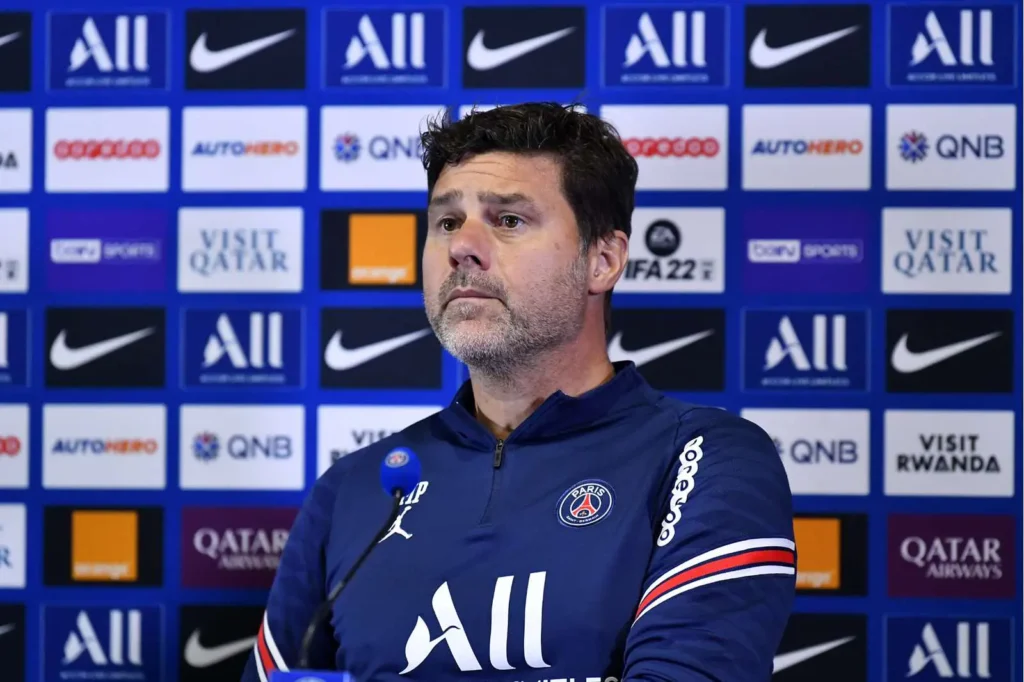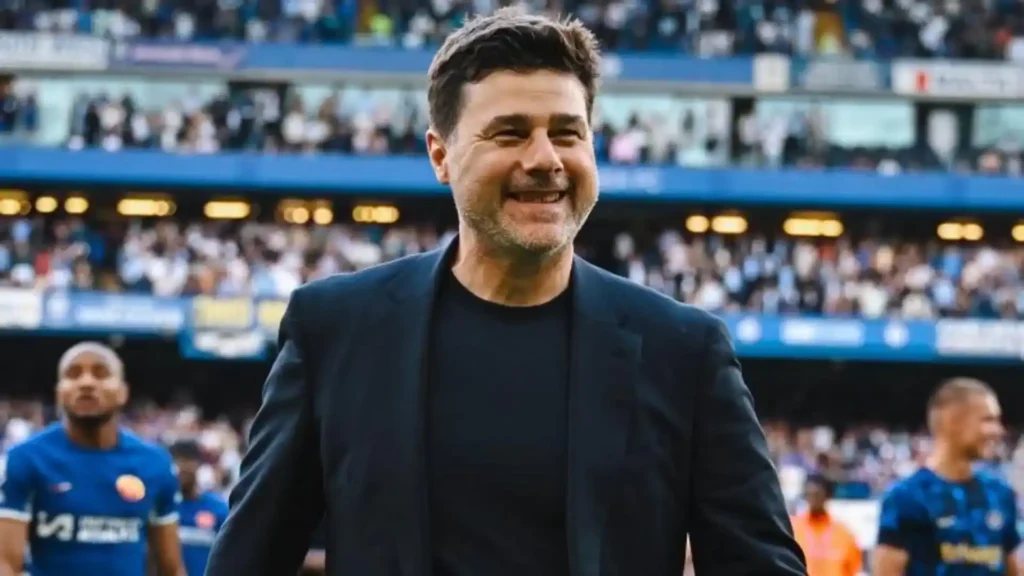Mauricio Pochettino’s appointment as the head coach of the U.S. Men’s National Soccer Team (USMNT) has certainly created a buzz in the soccer world. With the 2026 World Cup just around the corner, this move could potentially be a game-changer for American soccer. Pochettino, who is known for his tactical brilliance and ability to develop young talent, brings a fresh perspective to a team that has struggled to find its rhythm on the international stage. The big question now is: Can he, therefore, turn the USMNT into a serious contender for the 2026 World Cup?
Table of contents

Pochettino’s Background
Mauricio Pochettino, born on March 2, 1972, in Murphy, Argentina, is a well-known football manager. He has worked with top European clubs like Tottenham Hotspur, Paris Saint-Germain (PSG), and Chelsea. His managerial career spans over a decade, with an average tenure of 2.64 years at each club.
At Tottenham Hotspur, Pochettino transformed the team into a regular top-four contender in the English Premier League. Appointed in July 2014, he led Tottenham to the UEFA Champions League final in 2019. This was a significant achievement for a club often considered an outsider. During his time at Tottenham, Pochettino managed 293 matches with a performance per match (PPM) ratio of 1.84.
Pochettino also had a successful period at PSG, managing from January 2021 to July 2022. His tenure at PSG saw success, with a PPM ratio of 2.15 across 84 matches.
His managerial career began at Southampton, where he developed emerging talents. From January 2013 to June 2014, he helped shape many young players. His time at RCD Espanyol Barcelona, from January 2009 to November 2012, further showcased his ability to work with youth.
As a player, Pochettino had a notable career with clubs such as CA Newell’s Old Boys and RCD Espanyol Barcelona. He transferred to Paris Saint-Germain in 2001 for a fee of ₹24 crore.
Expectations for the USMNT
With Pochettino at the helm, expectations for the USMNT are naturally rising. The team’s performance in recent years, however, has been inconsistent. Disappointing results in major tournaments like the Copa America have raised concerns. Nonetheless, Pochettino’s arrival brings renewed hope that the team can turn things around, especially with the 2026 World Cup set to be hosted in the United States, Canada, and Mexico.
Pochettino’s main challenge, therefore, will be to bring out the best in the USMNT’s young stars. Additionally, he needs to instill a winning mentality in the team. His experience in top European leagues, where competition is fierce and the stakes are high, will be invaluable. It will, for this reason, help the USMNT prepare for the World Cup. Moreover, his tactical flexibility and ability to adapt to different situations could give the USMNT an edge against stronger teams.
Tactical Changes
One of the most exciting aspects of Pochettino’s coaching style is, without a doubt, his tactical approach. He is known for employing a high-pressing game, where the team puts intense pressure on the opposition to win the ball back quickly. This approach could suit the USMNT, which has many energetic and athletic players capable of executing this strategy effectively.
Pochettino often prefers a 4-2-3-1 formation. This setup could, therefore, work well with the current USMNT squad. In this formation, Christian Pulisic or Gio Reyna could play as the central attacking midfielder (No. 10). Two holding midfielders would, as a result, provide balance and support. This formation allows for a solid defense while also giving the team plenty of options in attack. However, the USMNT will need to improve its finishing in front of goal. The team has, in fact, struggled to convert chances into goals in the past.
Finally, Pochettino’s defensive setup will also be crucial. The USMNT has shown vulnerability at the back. Thus, it will be interesting to see how Pochettino addresses this issue. His experience managing top defenders like Jan Vertonghen and Toby Alderweireld at Tottenham could help him solidify the USMNT’s defense.
Also read Monopoly Go Uncharted Adventures: Comprehensive Guide.
Pochettino’s Impact on USMNT and 2026 World Cup Preparation
Mauricio Pochettino’s recent appointment as the head coach of the US Men’s National Soccer Team (USMNT) is creating significant buzz in the soccer world. With the 2026 World Cup approaching, this move could be a transformative moment for American soccer. Known for his tactical brilliance and success with top European clubs, Pochettino is expected to elevate the USMNT into a serious contender for the upcoming World Cup.
Mauricio Pochettino: A Proven Leader in Football
Mauricio Pochettino, with a career spanning major clubs in Europe, brings a wealth of experience to the USMNT. His notable stints include managing Tottenham Hotspur, Paris Saint-Germain (PSG), and Chelsea. Pochettino’s time at Tottenham Hotspur stands out, where he turned the club into a consistent top-four team in the English Premier League and led them to the UEFA Champions League final in 2019.
Pochettino is celebrated for nurturing young talent, as seen with players like Harry Kane, Dele Alli, and Son Heung-min flourishing under his management. This emphasis on youth development could be exactly what the USMNT needs, given their promising young core including Christian Pulisic, Gio Reyna, and Weston McKennie.
Pochettino’s Influence on the USMNT
With Mauricio Pochettino now at the helm, the USMNT’s expectations are high. Recent performances have been inconsistent, but Pochettino’s arrival brings renewed hope. As the 2026 World Cup will be hosted in the United States, Canada, and Mexico, Pochettino’s impact will be pivotal in preparing the team for the tournament.
Pochettino’s challenge will be to harness the potential of the USMNT’s young stars while instilling a winning mentality. His experience in the top European leagues, where competition is fierce, will be invaluable in this regard. Additionally, his tactical flexibility and ability to adapt could provide the USMNT with a competitive edge against stronger teams.
Tactical Approach and Formation
Pochettino is known for his high-pressing tactical approach, which emphasizes intense pressure on the opposition to regain possession quickly. This strategy aligns well with the USMNT’s energetic and athletic players. He often employs a 4-2-3-1 formation, which could be advantageous for the current USMNT squad. In this setup, Christian Pulisic or Gio Reyna could excel as the central attacking midfielder, supported by two holding midfielders.
However, the USMNT will need to enhance their finishing ability, as converting chances into goals has been a past challenge. Pochettino’s defensive strategies will also be crucial, as the team has shown vulnerabilities at the back. His experience with top defenders like Jan Vertonghen and Toby Alderweireld at Tottenham will be key in strengthening the USMNT’s defense.
Challenges Ahead
While Pochettino’s appointment has been met with optimism, there are several challenges he will need to address. Firstly, the USMNT has struggled with consistency, particularly in defense. The team has been prone to lapses in concentration, leading to costly mistakes in crucial matches. Pochettino will need to instill a sense of discipline and focus in the backline, ensuring that the team can maintain its shape and composure under pressure.
Another challenge will be finding a reliable goal scorer. Despite having several attacking options, the USMNT has often struggled to convert chances into goals. Pochettino will need to identify and develop a striker who can lead the line effectively, whether it’s someone already in the squad or a new talent emerging from the domestic leagues. His ability to bring out the best in attacking players could be the solution to this long-standing issue.
Additionally, Pochettino will have to navigate the cultural and tactical differences that come with coaching a national team, especially one as diverse as the USMNT. The American soccer landscape is unique, with players coming from various backgrounds, including MLS, European leagues, and college soccer. Pochettino will need to integrate these different styles and experiences into a cohesive unit that can compete on the world stage.
For More details check out The Rondo UWMNT Edition: How will Mauricio Pochettino change team, tactics, and 2026 World Cup expectations?
Building a Winning Mentality
One of Pochettino’s most important tasks will be to instill a winning mentality in the USMNT. The team has shown flashes of brilliance in the past but has often fallen short in critical moments. Pochettino’s experience in leading teams to punch above their weight will be crucial in helping the USMNT develop the mindset needed to compete with the world’s best.
Pochettino is known for his emphasis on hard work, discipline, and a team-first approach. These values align well with the American sports culture and could resonate with the players. By fostering a strong sense of unity and purpose within the squad, Pochettino can help the USMNT believe that they can compete with, and even defeat, the top teams in the world. This psychological edge could be the difference between a good World Cup performance and a truly memorable one.
The Road to 2026
As the 2026 World Cup draws nearer, all eyes will be on how the USMNT evolves under Pochettino’s leadership. The next two years will be critical in shaping the team’s identity, tactics, and overall strategy. Pochettino will likely use this time to experiment with different formations, assess player performances, and build a squad that is both balanced and dynamic.
Qualifying matches, friendlies, and competitive tournaments leading up to the World Cup will serve as important benchmarks for the team’s progress. Fans and analysts will be watching closely to see how Pochettino’s influence translates on the pitch. The ultimate goal, of course, is to perform well on home soil in 2026, but the journey there will be just as important in terms of building momentum and confidence.
Conclusion
Mauricio Pochettino’s appointment as the head coach of the USMNT has ushered in a new era for American soccer. With his tactical expertise, experience in top European leagues, and proven track record of developing young talent, Pochettino has the potential to transform the USMNT into a formidable force by the time the 2026 World Cup arrives. While challenges remain, particularly in defense and finishing, Pochettino’s leadership could be the catalyst that propels the USMNT to new heights on the world stage. The next two years will be a critical period of growth and preparation, as the team gears up to make a lasting impact in the global arena.






